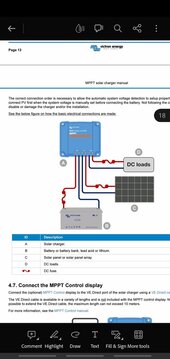DaveBad
New Member
I'm looking for some help to determine what size fuse I should have between the panel and the solar controller.
My panel:
Victron Energy SmartSolar MPPT 75-Volt 10 amp
My panel:
- Dimension: 25.20*20.87*1.18 inches
- Weight: 8.98 lbs
- Max Power Output(W): 60W
- Voltage MPP Vmp(V): 34.74V
- Current MPP Imp(A): 1.73A
- Voltage Open Circuit Voc(V): 40.07V
- Short Circuit Current Isc(A): 1.83A
Victron Energy SmartSolar MPPT 75-Volt 10 amp



